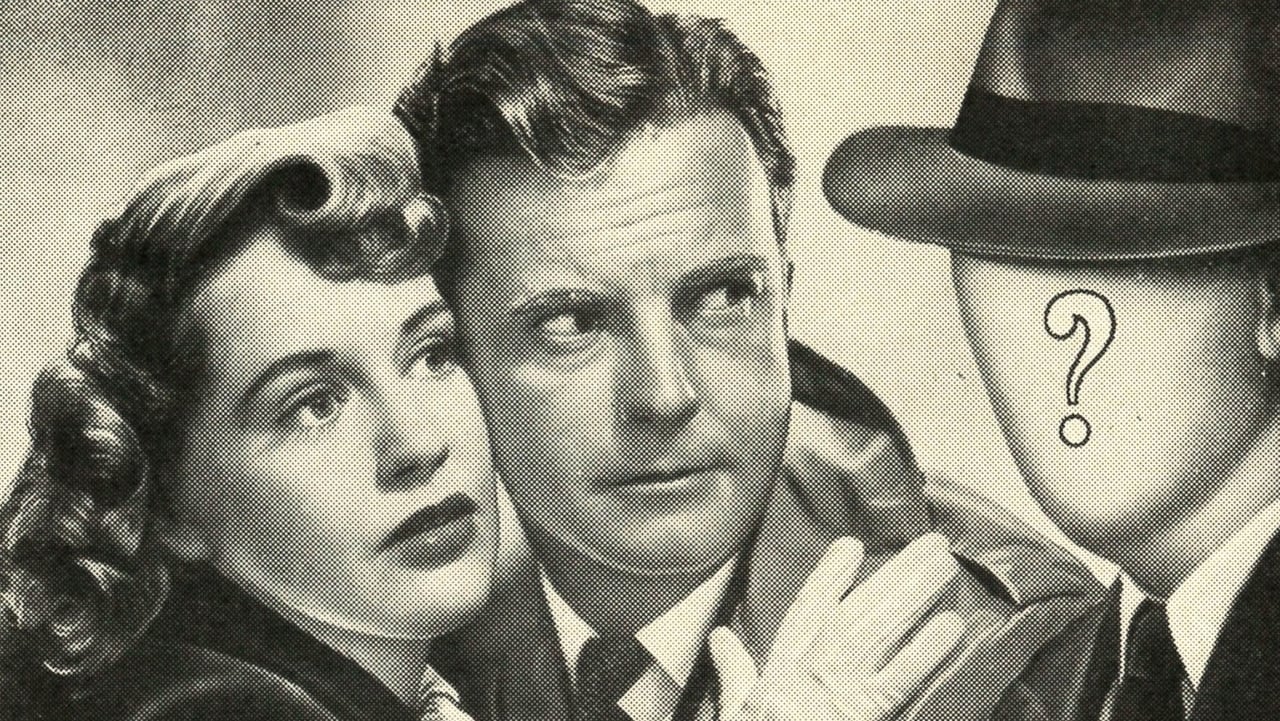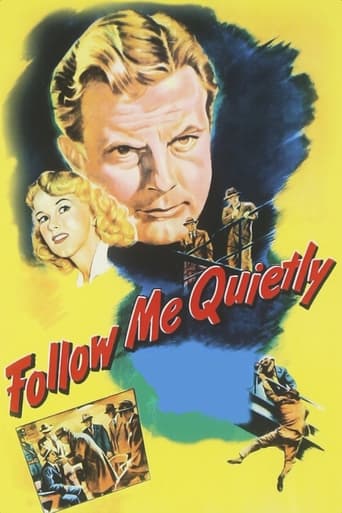

I've been on a film noir fix lately & finding these flicks on You Tube such as Private Hell 36, Crime Of Passion, The Killer Is Loose, Please Murder Me, Raw Deal, Black Angel etc. Most of these I enjoyed & I've watched them once but when I stumbled onto this one yesterday I watched it again today as it was a little more than what I expected. Follow Me Quietly is not really a film noir it's a crime drama & police procedural.It's a bit experimental & unusual which makes it stand out from the others, the late 40's post war period was a time when filmmakers were trying out new gimmicks such as subjective first person camera like Lady In The Lake (1946) & Dark Passage (1947). The police create a dummy of the killer from what evidence & clues they have which is a little more than the usual routine bulletin description of a suspect.Sometimes a person can be identified & recognized by the back of their head & ears & the size & shape of their body & physique. Since the police have never seen the killers face the dummy is faceless & startling. The scene where the killer replaces the dummy & sits in William Lundigan's office facing the window with it's back to him is clever but pointless & foolish. What if the detective was smart enough to notice it was really him ? Why would the killer take such a risk ? I think it was just a gimmick & for cinematic effect to satisfy the filmmakers & to give the audience a thrill. The silly trick worked & fooled me I thought it was the faceless dummy.And when the killers face is revealed he's not what you expect, he's very insecure & nervous & seems incapable of doing anything right. How did he manage to kill 8 victims & get away with it ? The ending is similar to White Heat & this film isn't great but it's fun & interesting, different & memorable & worth watching. I've seen it twice & I may watch it again.
... View MoreThough they generally weren't required to do much, the cast members in "Follow Me Quietly" were great at what they did.Bill Lundigan was a good-looking guy who could have got by just on his looks. In this movie, he got to take off his shirt, or perhaps had to take off his shirt, and it gave an obvious thrill to Dorothy Patrick, who was really attractive and handled her role quite well, too.The great, and terribly under-appreciated, Jeff Corey had the number two male part – and as to "under-appreciated," well, yes, he had a long and busy career. He was the bad guy who started the action in "True Grit" and he played Abe Lincoln at least twice.Still, a man with this much talent just could never have been thoroughly and properly appreciated, at least not enough to suit me.There was a montage sequence that might be a staple of B films, but this one was done as well as any A picture could have done it.It is interesting to watch the differences in police procedures, from this 1949 film to the latest films and TV shows.A lot happens in this 60-minute run time, even the killing of a newspaper editor, the only murder in a string of seven that might earn any audience sympathy."Follow Me Quietly" is a good one to watch.
... View MoreExactly what I was looking for on a sleet-filled Sunday nighta 60-minute crimer that is as ludicrously entertaining as it is nonsensical. A serial killer calling himself "The Judge" strikes on rainy nights, strangling his victims and leaving behind stenciled notes with warnings like, "I have been ordained to destroy all evil!" That one was left behind on an editor's desk, after the killer pitched the newspaperman through a second-story window (notable for the victim narrating the struggle in flashback). The cops are given hilarious dialogue that never fails to provoke a giggle. In one scene, the tough detective covering the case runs down the list of evidence. Regarding the killer's personality, he offers, "And we know how he thinkshe likes passing judgment on people." His wisecracking partner actually gets off a few humorous quips. The detectives get the inspired idea to create a faceless dummy to supplement their "routine bulletin information," which adds absolutely nothing to that knowledge but an odd, faceless, 3-dimensional model to complement their faceless, 2-dimensional sketches. And what a rough customer the protagonist is! He's absolutely ruthless to a (beautiful blonde) reporter, heaping insults at her ("that rag of a newspaper belongs in the river!") and basically scolding her for being an information whore. Somehow she falls for him. As written by Lillie Hayward and Anthony Mann, the film has a surprising streak of ill will towards print media; through Lundigan, they effectively state that newspaper coverage will inspire a breed of copycat killers. And did Anthony Mann step in to direct that incredible finale in a chemical plant? I wonder. It features his fascination for geometric angles and outstretched hands to the face and such. I never tire of movies like this. An unpretentious good time courtesy of the old RKO studio and solid worker-bee Richard Fleischer.
... View MoreHow about the distance running chase scene that involved running up hundreds of stairs after the already long, long run? The "Judge" was a chain smoking out of shape middle aged man. How in the hell was he supposed to run like a world class middle distance runner? (I have been a lifelong runner and notice these things.) This chain smoking weakling couldn't have run more than a few steps without becoming exhausted. I also disagree with the woman who said that Dorothy Patrick was not attractive. I thought she was was of the best looking naturally pretty women that I have seen in films, and I have seen close to 2000 in my 61 years.
... View More